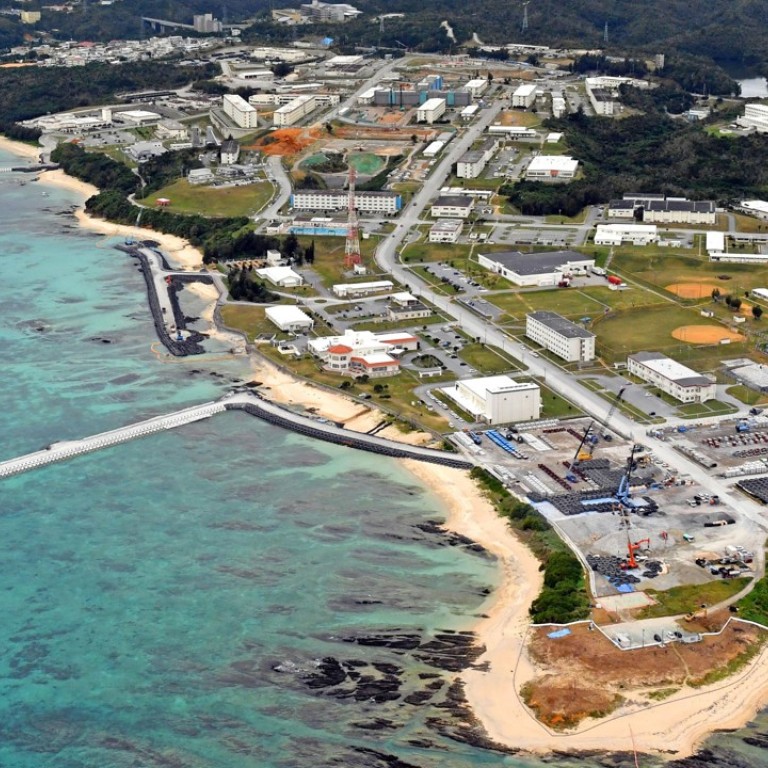
Japanese island community split over US army base Camp Schwab expansion as mayoral election looms
Sunday’s vote has effectively become a referendum on whether the base should be accepted or whether it should be closed down
Sunday’s vote has effectively become a referendum on whether the base should be accepted or whether it should be closed down
There is effectively only one issue that will decide Sunday’s mayoral election in the small town of Nago, in Okinawa Prefecture. But it is one that has pit neighbour against neighbour and family members against each other.
“This is a really tight-knit community and if you asked their personal feelings, I don’t think anyone would say they want the US base to be enlarged,” said Hideko Otake, who is involved in the campaign against the development of the US Marine Corps’ Camp Schwab.
“But equally, there are a lot of companies who will benefit from having the Americans here and people in business are putting pressure on their employees to vote in favour of the plan.
“There are other groups that have effectively been bought by the government, such as the local fishing cooperative, who took a payoff because the work is going to affect their business, so now the fishermen work as security guards,” she said.
“It is all creating a lot of pressure in the community.”
Nago sits astride the main island of Okinawa and, since 1959, has been home to Camp Schwab. Locals have largely tolerated the US troops at the base, with the few accidents or petty crime – sometimes punctuated by more serious incidents – grudgingly accepted as a fact of life for Okinawan communities living with American bases in their midst.
There is also growing evidence that China is pumping money into the anti-base groups in order to delegitimise the US bases
But local attitudes began to change a decade ago, when Tokyo and Washington agreed to close the Marine base at Futenma, in central Okinawa, and relocate thousands of troops to Guam, the Korean Peninsula and northern Australia. Several thousand more are to be transferred to Camp Schwab, where work is under way to construct two new offshore runways and a host of new installations and facilities.
Sunday’s election has effectively become a referendum on whether the base should be accepted or whether it should be closed down.
Recent opinion polls suggest incumbent mayor, Susumu Inamine, has the support of 63 per cent of local residents who oppose more US troops in the neighbourhood.
It is a position is shared by Okinawa Governor Takeshi Onaga, who has widespread local support for his campaign to reduce and ultimately remove all the US bases and personnel from the prefecture.
On the other side of the electoral coin, Taketoyo Toguchi is campaigning to reinvigorate the local economy with more new faces, which he said will help support hotels, restaurants, the construction sector and countless other businesses. Toguchi has the support of the national government and, if he wins, is expected to receive funds from Tokyo to support the town’s economy.
But critics say the base’s expansion work will cause untold damage to the local flora and fauna and fear their community will be unable to cope with such a large influx of US troops. They say there is too little local entertainment for base personnel and it could cause an increase in crime.
But Otake has a more fundamental reason for her opposition.
“The base is not needed for the defence of Japan and building it here it will only serve to increase the threat to local people’s lives,” she said. “If there is another conflict, the base will become a target.”
Now 73 years since the battle for the Japanese islands, during the closing stages of the second world war, Otake asked why is Okinawa once again to be “sacrificed in the name of the security of Japan?”
But while local opposition is strong, there is a growing sense among many Japanese that the nation, now more than ever, must be prepared to fend off threats posed by some of its Asian neighbours.
“Over the past year or so, North Korea’s missile launches and nuclear tests, as well as Chinese submarines being detected just off the coast here, have changed the tone of the debate,” said Stephen Nagy, a senior associate professor of international relations at Tokyo’s International Christian University.
“Japan as a whole has also enjoyed something of an economic uptick in that time and I think that has taken a bit of the disgruntlement out of the issue,” he said.
“There is also growing evidence that China is pumping money into the anti-base groups in order to delegitimise the US bases.”
He said some people in Beijing have voiced the opinion that Okinawa is historically a part of China.
“My sense is that there is much more support in the broader Japanese society for enhancing the security of the nation’s islands and that is one of the main reasons for Shinzo Abe being voted in as prime minister,” Nagy said.
But the people of Nago are largely concerned with their local communities, rather than the bigger picture, and their vote is likely to reflect that.

